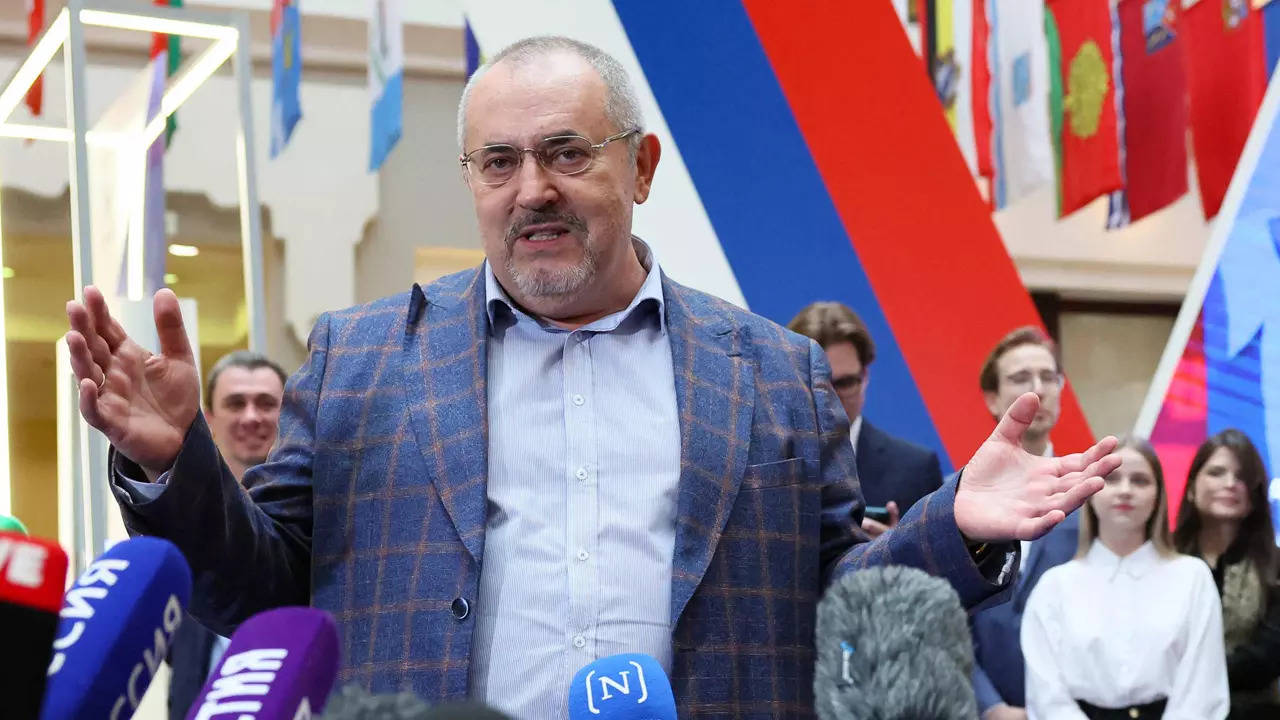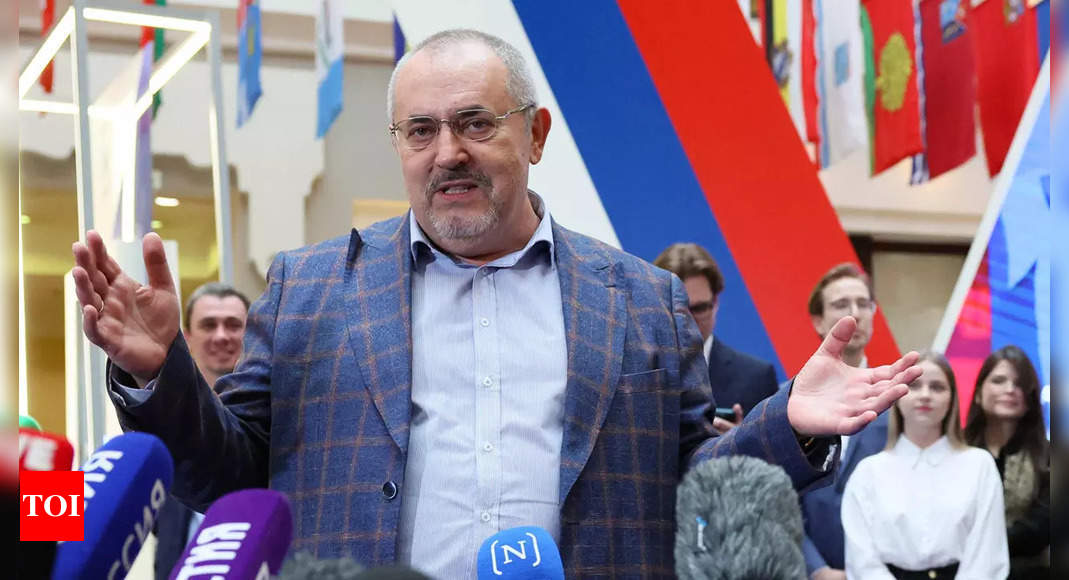
NEW DELHI: Boris Nadezhdin, the anti-war candidate challenging President Vladimir Putin, has officially submitted his bid for the Russian presidential elections.
On Wednesday, Nadezhdin said that he has submitted 105,000 signatures in his support to Russia’s Central Election Commission (CEC).
The CEC will check the authenticity and quality of the signatures submitted by Nadezhdin and other would-be candidates and announce next month who will join Putin on the ballot paper.
Why his presidential bid is special
Nadezhdin is posing a rare challenge to Putin, who is often seen as the president for life, just like his Chinese counterpart Xi Jinping.
Even before the elections, Putin’s victory is widely seen as a foregone conclusion.
So far, the CEC has approved three candidates for the ballot: Nikolai Kharitonov of the Communist Party, Leonid Slutsky of the Liberal Democrats, and Vladislav Davankov of the New People party.
But none of these candidates are perceived to pose a serious challenge to Putin’s anticipated victory in the upcoming election.
Yekaterina Duntsova, another candidate critical of the offensive in Ukraine, was barred from running over alleged errors in her paperwork.
Thus, Nadezhdin, who is presenting a rare criticism of the war, is seen as an unlikely challenger. He believes he was let through because his candidacy came from an officially registered party — a conservative party called Civic Platform that has no seats in parliament.
Speaking to reporters outside his modest apartment in Moscow, he acknowledged it was unlikely he would be allowed to challenge Putin or appear on state television. “I assure you my support would grow” were he allowed a platform on state media, he said.
How Nadezhdin shot to fame
Nadezhdin has surprised observers with strong criticism of Russia’s war in Ukraine, which Kremlin describes as “special military operation”.
In an interview with AFP, Nadezhdin — whose name shares a root with “nadezhda”, the Russian word for “hope” — described the conflict as “catastrophic” and said he wanted to “free political prisoners” in Russia.
After a series of heating outages across Russia during an unusually cold winter, Nadezhdin said earlier this month that the country would be able to afford to spend more on its citizens if it was not pouring so much money into the military.
With his contrasting anti-war stance, Nadezhdin has been definitely making some noise in Russia. His calls to stop the intervention even brought out crowds across the country eager to add their signatures to his bid to get on the ballot.
More about Nadezhdin
(With inputs from agencies)
On Wednesday, Nadezhdin said that he has submitted 105,000 signatures in his support to Russia’s Central Election Commission (CEC).
The CEC will check the authenticity and quality of the signatures submitted by Nadezhdin and other would-be candidates and announce next month who will join Putin on the ballot paper.
Why his presidential bid is special
Nadezhdin is posing a rare challenge to Putin, who is often seen as the president for life, just like his Chinese counterpart Xi Jinping.
Even before the elections, Putin’s victory is widely seen as a foregone conclusion.
So far, the CEC has approved three candidates for the ballot: Nikolai Kharitonov of the Communist Party, Leonid Slutsky of the Liberal Democrats, and Vladislav Davankov of the New People party.
But none of these candidates are perceived to pose a serious challenge to Putin’s anticipated victory in the upcoming election.
Yekaterina Duntsova, another candidate critical of the offensive in Ukraine, was barred from running over alleged errors in her paperwork.
Thus, Nadezhdin, who is presenting a rare criticism of the war, is seen as an unlikely challenger. He believes he was let through because his candidacy came from an officially registered party — a conservative party called Civic Platform that has no seats in parliament.
Speaking to reporters outside his modest apartment in Moscow, he acknowledged it was unlikely he would be allowed to challenge Putin or appear on state television. “I assure you my support would grow” were he allowed a platform on state media, he said.
How Nadezhdin shot to fame
Nadezhdin has surprised observers with strong criticism of Russia’s war in Ukraine, which Kremlin describes as “special military operation”.
In an interview with AFP, Nadezhdin — whose name shares a root with “nadezhda”, the Russian word for “hope” — described the conflict as “catastrophic” and said he wanted to “free political prisoners” in Russia.
After a series of heating outages across Russia during an unusually cold winter, Nadezhdin said earlier this month that the country would be able to afford to spend more on its citizens if it was not pouring so much money into the military.
With his contrasting anti-war stance, Nadezhdin has been definitely making some noise in Russia. His calls to stop the intervention even brought out crowds across the country eager to add their signatures to his bid to get on the ballot.
More about Nadezhdin
- Boris Nadezhdin, 60, is a local councillor in Russia
- Before entering politics, he was an engineer and researcher at the All-Union Research Center for the Study of Surface and Vacuum Properties from 1985 to 1990.
- Nadezhdin has been in politics since the early 1990s, when he was a member of the reformist Yabloko party and a deputy in the State Duma, the lower house of parliament.
- He later joined the Union of Right Forces, another liberal party, and served as a deputy minister of regional development under President Dmitry Medvedev.
- He is of Russian, Ukrainian, Polish, Romanian, and Jewish heritage. He survived the Tashkent earthquake, which occurred on his third birthday.
- He comes from a long line of Russian Orthodox priests. His grandfather was a Soviet Uzbek composer and associate professor at the Tashkent Conservatory.
- Nadezhdin is also an academic and a professor of economics at the Moscow State Institute of International Relations. He has written several books and articles on political and economic issues, and has been a frequent commentator on Russian media.
- Throughout his career, Nadezhdin has made statements that have been criticized as Islamophobic and has been involved in activities with nationalist undertones.
(With inputs from agencies)
Source link

